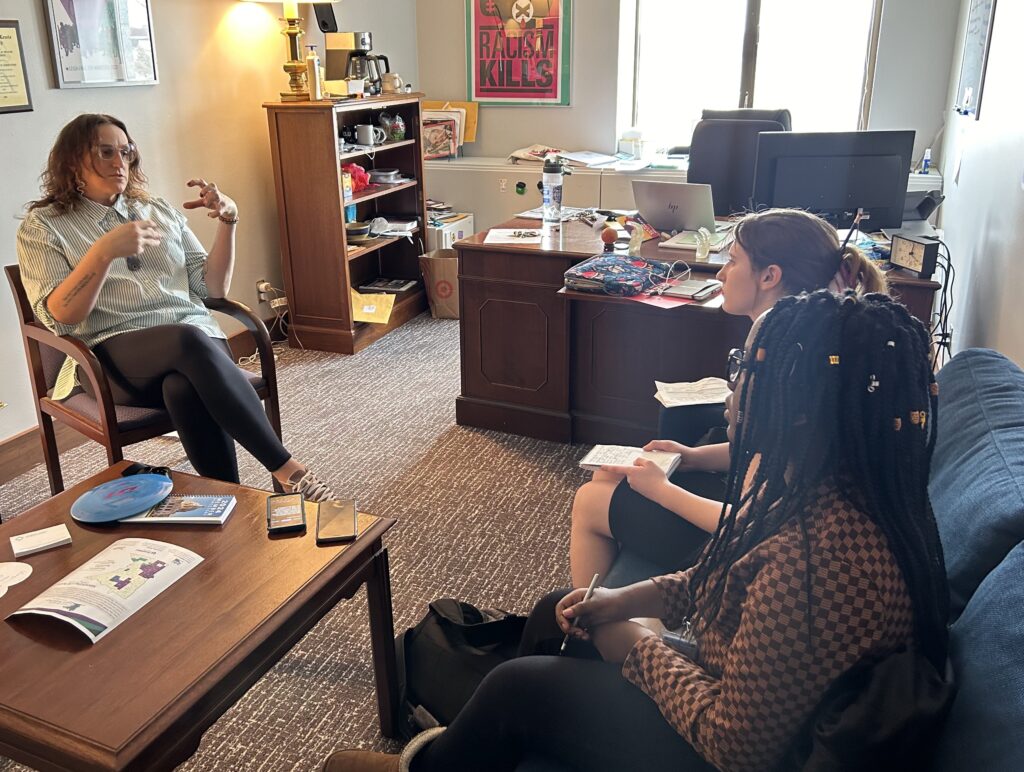
In 2023, 503 anti-trans bills were introduced across the U.S., with 85 of them being passed in Congress, according to the Trans Legislation Tracker. In response to this influx of anti-trans legislation, many states have sought to become sanctuary states for transgender people seeking gender-affirming care, with Minnesota becoming one of them. During the last legislative session, the Minnesota passed a law allowing transgender people to seek gender-affirming care in Minnesota without being penalized or prosecuted in their home state for doing so.
Rep. Leigh Finke (DFL, St. Paul), Minnesota’s first openly transgender legislator, spoke with ThreeSixty reporters about what becoming a trans refuge state means for Minnesota and the future.
ThreeSixty also interviewed Kat Rohn from OutFront about advocacy efforts the organization is leading.
This interview has been edited for length and clarity.
Now that the Trans Refuge Bill has been around and in action for almost a year, have you been seeing the progress you hoped for?
We passed the bill at a time when about five states had banned gender affirming care for minors and “vulnerable adults.” Now it’s about 27. The urgency of the bill just continued to grow. We didn’t know whether to expect people to come here to access care from their homes, or if they were going to move here. Since we passed the bill, we have seen a lot of people coming. There’s a group called Minnesota Trans Intersex Resource Network (MTIRN) that has formed to manage the need that the trans refuge bill created. It’s a process – protection is a promise that you make forever. This year, we have more bills to help us fulfill that promise.
Could you tell me about some of those bills?
I have a bill going to the Workforce Committee. It’s $1 million for a group called PFund, which would be distributed through small grants to local organizations supporting incoming or recent arrivals. It helps us get a little bit of stabilization for the first couple 100 families and many, many more young people who have come to the state.
We also have a bill that would clarify gender affirming care for health insurance coverage. It’s really important to make sure that insurers are covering all of the elements of gender affirming care, which is a complicated form of health care. It’s easy for insurers to cut certain pieces out of their coverage, rather than cover the whole spectrum of care. These bills are two of many examples.
There’s been a lack of gender affirming healthcare providers. What are your long- and short-term goals?
That’s a huge problem, because we were already short on the number of people who are able to provide gender affirming care compared to the need before the Trans Refuge Bill. We need to increase the number of people who are providing it, and we need to increase the number of locations where those providers live. Not all trans people live in the city. It’s difficult to find a way to get more people to practice a certain kind of health care through policy.
What I’m interested in doing is finding a recruitment tool. Say you live in Missouri, and your patients are moving out of Missouri because healthcare is being restricted. I want to find a way to get those providers here as well- to recruit them to fill that gap. It’s going to be a long-term problem that we’ll have to work on. There was a national shortage of workers in all fields. It’s not unique to us in our healthcare, but we’re trying to find a way to solve it.
It’s a big election year. Do you think that this bill, and the follow up bills, are going to be hot-button issues?
Trans lives and health care will be an issue in elections, not because of us (trans people), but because of the opposition. They want to make it a big deal, and that has never been a good idea for them. They never actually win elections when they complain about trans people.
Keira worked with Katelyn Vue, Sahan Journal reporter and ThreeSixty alum, to finish her story. This story was completed at ThreeSixty’s Winter News Team: Capitol Edition in February 2024, where high school journalists covered important legislative issues, impacting Minnesota youth. Read more stories here.
